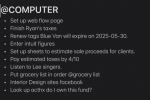You responded to Fooddude, but I'm going to respond anyway.

I would not be able to work this way. When I'm looking for something to do, I want to see nothing but tasks. And, narrowing further, nothing but tasks that I could actually do now. If the tasks take up more than one phone screen, or more than a third of a computer screen, there are too many for me, and the excess needs to go away somehow. (Someday/Maybe, future start date, group like with like and then put those in a list and create a single task that refers to that list, etc.)
Of course, OmniFocus (what I use for my personal tasks) supports all this juggling. Not all systems support those things that easily. But I (laboriously) got a fair bit of it to work in a Trello-like interface that's my best choice at work.
That's not just normal, it's....well, it would be abnormal for it to NOT be true. Although if you mean that a project has two (or three, or five) very separate threads of actions, my strategy for that is usually to divide it into multiple projects.
You could put what you really do need to remember somewhere other than your "what do I do now?" list. Where to put that information depends on the project and what you might want the information for.
For example, I'm raising seedlings in a more ambitious way than usual this year, but most of the completed actions (get plug trays, get pelleted seed for this, get vermiculite for that, blah blah) just get checked off and vanish. The stuff I might want to remember for reference--when I planted something, and how, for example, so that if it's a success I know to repeat it--I log in my garden notes. Those notes are nowhere near my action lists.
Future actions often go into lists that I regard as project support material. For example, I have a "countdown until last frost date" list that I've been consulting every week. The action to consult it is in my active lists (as an automatically repeating action, so when I check it off it disappears for a week.) And if the list gives me an action (I can plant nasturtiums!) then I'll add that to my current actions.
But that means that the list, which could have dozens of items, is out of my face until the items are relevant.
I think(?) you may have mentioned times when you're short on energy? I always make sure there are some low-energy, low-thought, low-stress actions in my current action list, even if those aren't a particular high priority. I know that there are lots of times when I will not be working at my best capacity, so I may as well be prepared to get something done, rather than nothing. I regard that as a context.

